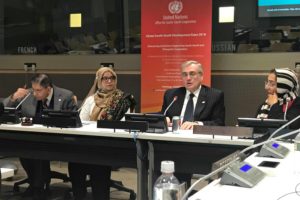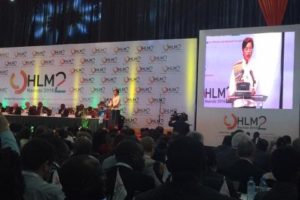Campaign for People's Goals responds to post-2015 report
The High Level Panel on Post-2015 has missed a valuable chance to provide a bold vision for a fairer, more sustainable and people-centred world. While there are welcome components, the report promotes the prevailing development paradigm with proposals that support the neo-liberal model for economic growth. It has failed to meet civil society expectations for a roadmap to guide a real transformative development agenda.
There are concrete proposals in the High Level Panel (HLP) Report that we strongly support, including:
- recognition of human rights and the right to development as underlying principles that frame development;
- proposals that go beyond the narrow MDG framework;
- calls for accountability mechanisms; and
- a “data revolution” that would disaggregate data by gender, geography, income, and disability.
- In line with the global mood for deep-going changes in development policy, the HLP Report identified five transformative shifts intended to achieve the “transformative development agenda” as urged by all actors. But these aspirations have not been coupled to solid proposals to ensure their realization.
There are two overarching themes in the HLP Report that greatly concern us:
‘Bigger, better’ MDGs. The HLP Report is much more comprehensive than the MDGs and incorporates many missing elements. But there were hopes that it would take from the many consultations the need to rethink development and to adopt a transformative development agenda. While taking some hesitant steps towards this, the list of 12 targets and goals still feels like a longer version of the MDGs but with revamped targets.
Some goals under MDG were simply split, rearranged, regrouped, or relabeled. Some new ones, such as peace and security and good governance, which were neglected concerns in the MDGs, were added as standalone goals.
The new goals and targets leave a sense of the “add and mix” formula being applied again. The most glaring omissions have been added to the MDG batter, which was then stirred. The new set of goals nevertheless continues the prevailing development agenda and technocratic solutions based on finance and technology, instead of redressing inequalities in wealth and power that underlie poverty and underdevelopment, and embracing development as a much more comprehensive process.
Business leading the way. A big difference between the HLP Report and the MDGs is the more prominent role given to the private sector, in particular large-scale business. The HLP Report shows a tendency to give leadership in development to the private sector, with many references throughout the document about business being essential to development. The HLP claims to have met with 5,000 civil society representations and 250 corporate CEOs, but doesn’t say how it weighted those different meetings. The document mentions much more frequently business, corporations and companies (120x) than government (80x) and civil society (30x).
HLP recommendations treat business as deserving of equal priority and rights to land property. Women’s rights under the proposed gender goal, for instance, are measured in terms of their business and property rights. The proposed goal on jobs emphasizes the need for creating an “enabling business environment and boosting entrepreneurship” but is silent on the long experience of many countries where neoliberal pro-business policies have led to jobless growth.
The report refers to accountability mechanisms for states and business alike, but fails to recognize the need for stronger regulatory frameworks especially directed at the corporate sector, which is responsible for much of the unsustainable production and consumption patterns and human right violations prevalent in the world today. Instead it relies on the “willingness on the part of large corporations as well as governments to report on their social and environmental impact in addition to releasing financial accounts.”
Repeated calls to the HLP have emphasized that we need a new and transformative development model. We have called for goals that aim for redistribution of wealth, power and resources between countries, between rich and poor and between men and women. But it appears that the HLP report would put business at the centre of the development agenda rather than end business as usual.#



